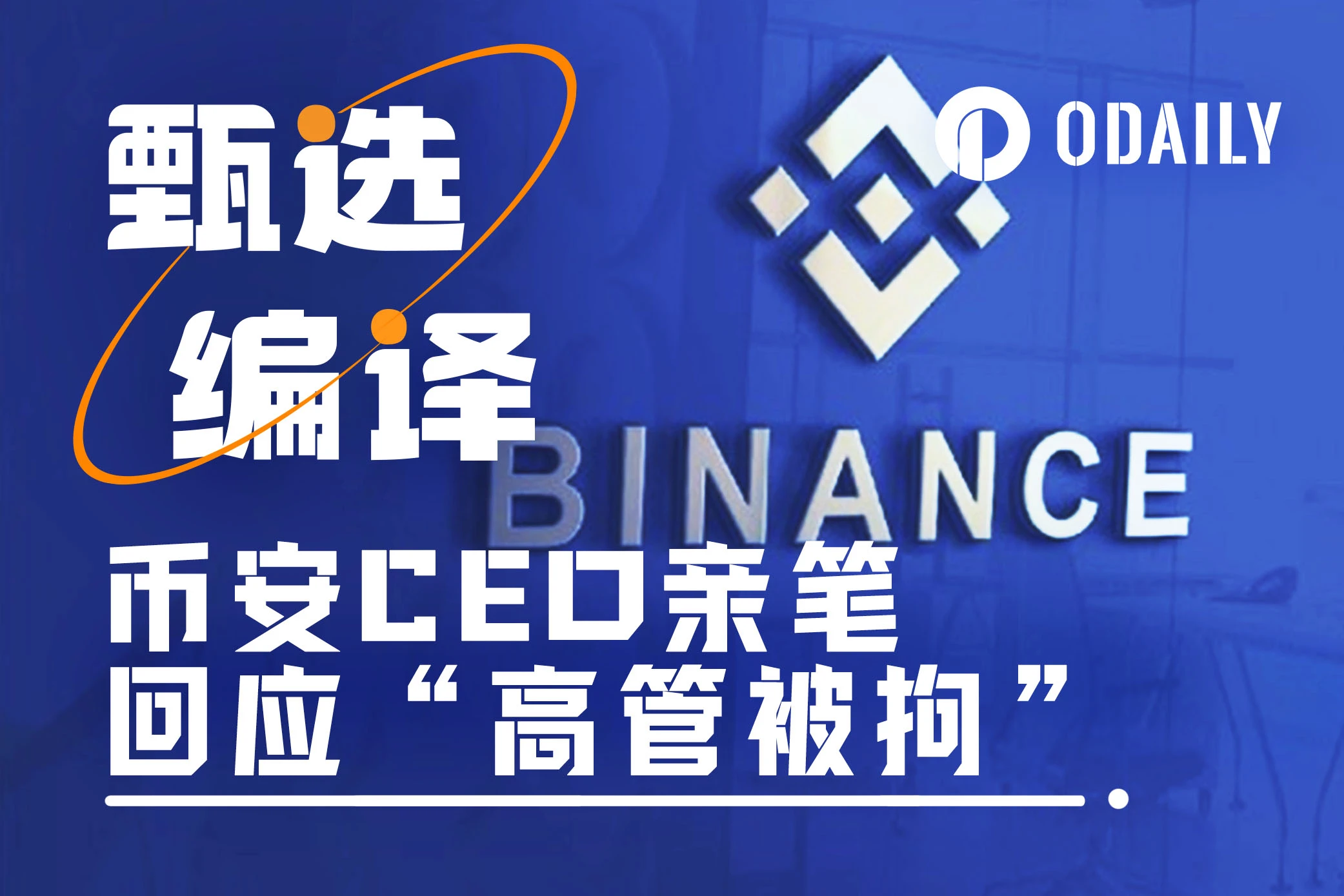原文作者:Richard Teng
编译:Odaily星球日报 Azuma

如你所知,我们的一位同事 Tigran Gambaryan 已被尼日利亚当局拘留超过 70 天。此事已引发了许多公众评论,我想借此机会澄清一些事实,以防止社会对此事的看法遭遇不公正的扭曲。此外,我也认为有必要代表全球性的商业组织发表一些意见 —— 以协助政策制订为由邀请某家公司的员工参会,结果却将他们扣留,这对于所有全球性公司而言都是一个危险的先例。
首先,我想介绍一下 Tigran,自从我加入 Binance 以来,我进一步了解了 Tigran,且对他越来越敬佩。然而极具讽刺意味且不幸的是,这位在私营和公共部门广受赞誉的顶级全球金融犯罪打击者,因一些牵强的理由已在尼日利亚被拘留了超过两个月。
Tigran 将他的整个职业生涯都投入到了打击金融犯罪中。Tigran 任职联邦警察十年的经历曾被记载在《黑暗中的追踪者:追捕加密货币犯罪领袖的全球行动》一书中,我们几周前也曾发布了一篇博客,进一步分享了他在犯罪打击方面的杰出成就。
在卸任美国国税局特别办案官之后,Tigran 加入了 Binance,继续着他一直以来的工作。Tigran 意识到,在加密货币这个新兴行业内最大的公司工作,能够更有效地打击不良行为者,维护市场的稳健运行。任何一名从公共服务部门转至私营部门的人都可以告诉你,有时在一个具备巨大规模的私营公司工作反而能产生更大的正面影响。
基于这样的背景,Tigran 在 2021 年被 Binance 聘请,来帮助我们建立和强化执法合作、阻止金融犯罪等合规事项。作为 Binance 金融犯罪合规团队的负责人,Tigran 一直是 Binance 制定政策、维护合规的坚定倡议者,其工作为行业设立了新的标准。在 2022 年和 2023 年期间,Tigran 的团队协助全球执法机构冻结和查获了价值超过 22 亿美元的资产,其中包括与美国 FBI、司法部、禁毒署等机构合作冻结的超 2.85 亿美元资金。
最后值得注意的是,Tigran 并不是以“决策者”或“谈判者”的身份前往了尼日利亚,他只是作为一名金融犯罪和政策制订等方面专家去参与讨论。
尼日利亚当地监管背景
我认为,重温一些故事有助于帮助大家重构我们在尼日利亚的活动历史。实际上,这个故事始于近两年前。
2022-2023
2022 年 5 月,尼日利亚证券交易委员会(下文统称 SEC)发布了数字资产的监管规定,将加密货币纳入其监管范围。规定要求在尼日利亚运营的加密货币交易所需获得 SEC 的许可并遵守某些要求,然而这些规定未能清楚阐述一些关键的许可要求(例如申请流程、许可费用等),实际上使申请许可变成了一件不可能的事情。
Binance 主动多次联系 SEC,寻求有关许可流程的实际指导,并提议与尼日利亚当局进行咨询性交流。
例如,在 2022 年 6 月 22 日的一封信中,Binance 表示:“我们欢迎并感激有机会与 SEC 和区块链联盟中的其他行业参与者合作,以在未来几天进一步明确新规则的适用情况,特别是尼日利亚中央银行对该规则的立场、注册的费用结构以及注册对地区银行账户便利化的影响。”
然而,Binance 从未收到 SEC 的任何回应。据我们所知,迄今为止,尚无任何虚拟资产服务提供商(VASP)在新规框架下获得许可。
将近一年后,即 2023 年 6 月 9 日,SEC 在其网站上发布了一则通告,警告尼日利亚公众注意 Binance 交易所的活动,并指示 Binance 立即停止吸引尼日利亚投资者。通告中指出:“Binance Nigeria Limited 未在本委员会注册或受规管,因此其在尼日利亚的运营是非法的……通过此通告,现指示 Binance Nigeria Limited 立即停止以任何形式吸引尼日利亚投资者。”
通告中提到的“Binance Nigeria Limited”是不正确的。Binance Nigeria Limited 与 Binance 并无关系,而是由第三方注册,目的可能是为了在 Binance 于尼日利亚构建本地服务时套利获益。然而,显然 SEC 是冲着 Binance 本身而来的。
意识到 SEC 其实是为了向真正的 Binance 发出这一通知,Binance 立即暂停了在尼日利亚的招揽活动,包括付费广告、搜索引擎优化、线上和线下活动,以及针对用户的所有通信。这些限制至今仍在实施中。
在当时我们发送给 SEC 的信中,我们重申 Binance“完全致力于与委员会合作并遵守相关规定”,并请求与 SEC 会面(注意之前Binance 曾请求会面,但未收到 SEC 的回应)。
一如既往,SEC 没有回应。我们只能尝试继续与 SEC 保持建设性的互动,并在 2024 年 3 月 29 日提供了对其修订后规则的意见反馈。
2023 年 8 月,我们决定通过尼日利亚的数字资产行业进行接触。我们开始支持数字货币联盟(DCC),这是一个由尼日利亚当地和国外数字资产服务提供商组成的行业协会,旨在推进监管讨论,完善加密货币规定。
2023 年 11 月,我们在尼日利亚做了一些我们曾在全球各地与执法机构合作的事情:Binance 为尼日利亚金融情报单位(NFIU)和经济与金融罪案委员会(EFCC)进行了执法培训。这些努力不仅在全球范围内提升了与加密货币相关的犯罪打击工作效率,而且成为了 Tigran 团队更紧密地与执法机构合作的重要关系构建工具。
2023 年 12 月初,Binance 收到了众议院金融犯罪委员会主席的一封信,要求我们在不到两周的时间内出席一次公开的调查听证会。
2024
最终,通过非正式途径,我们与委员会达成一致,同意将听证会重新安排到 2024 年 1 月 10 日,以便我们有充足的时间准备和派遣一支了解相关重要议题的 Binance 员工代表团。
Tigran Gambaryan 和我们团队的其他几名成员前往尼日利亚参加了这次会议以及相关的其他会议。1 月 5 日,Binance 员工与尼日利亚金融情报单位(NFIU)会面,讨论了信息共享以及持续性的能力建设。双方讨论达成的共识是,下一步 NFIU 将分享一份谅解备忘录(MoU),列出关于分享反洗钱相关信息的提议条款和条件。
1 月 8 日,Binance 员工在阿布贾的众议院大楼与众议院金融犯罪委员会(HCFC)的三名成员及一名书记员进行了面对面的会议,这是预定的私下前期接洽。会议由 Peter Akpanke、Philip Agbese 和 Peter Aniekwe 以及一名书记主持。
在会谈中,委员会强调了所讨论问题的重要性,以及他们准备起诉 Binance 的决心,包括对我们的团队和首席执行官发出逮捕令,并禁止我们的团队离开该国。虽然情况令人担忧,但我们明白 HCFC 实际上没有发出逮捕令的权力。
委员会确认,公开听证会将于 1 月 10 日举行,Binance 将有机会在申诉人、媒体及 30 多个机构的在场下公开回应任何指控。
尽管多次请求,Binance 仍未收到有关指控的详细信息,因此我们的员工询问是否有机会以书面形式提交回应,且不进行公开听证会。这样做的原因有很多,比如信息可能具有一定的敏感性,以及我们的员工可在查看完整指控后准备更充分的实质性回应。会议最后,主席确认他们会考虑此事,并通过 Binance 的当地律师回复。
然而,当我们的员工离开会场时,他们却被一些不明人士接触,这些人向他们建议支付一笔费用以了结这些指控。当天晚些时候,我们的当地律师 —— 当时曾代表我们 —— 被委员会通过一名自称是其代理人的人召见,这个人传达了委员会的条件并指导我们的律师向我们提供建议。律师反馈说,他收到了在 48 小时内秘密支付一笔大额加密货币的要求,以解决这些问题,我们需要在早上做出决定。我们的团队对于在尼日利亚的安全越来越感到担忧,并立即离开。当然,我们通过律师拒绝了付款要求,因为我们不认为这是一个合法的和解提议,并澄清我们只有在满足以下条件时才会参与和解谈判:
Binance 需要看到相关的申诉和/或所有指控的详细信息;
和解必须源自官方,需要有书面形式记录,且由所有相关方签字;
和解必须涉及所有相关机构,且需保证可全面解决所有指控(如果适用的话,也包括任何潜在的历史税务负债责任)。
虽然和解的具体条款可能需要保密,但必须有一些公开承认达成了解决方案的声明。
委员会讨论之前不应该有公开听证会;
我们的承包商和员工不应受到恐吓、骚扰或拘留。
我们的律师传达了 Binance 的条件,最初遭到了反对。然而,我们的律师告知我们,委员会最终同意了上述条件。
这次行程返回后不久,NFIU 共享了草拟的 MoU,该 MoU 概括了Binance承诺自愿提交可疑活动报告(SARs)和可疑交易报告(STRs),为尼日利亚和其他地区的执法机构提供培训,以及双方互相合作的承诺。我们认为这是在努力使加密货币更安全、远离犯罪活动的合作中的一次积极发展。
2 月 5 日,一位与当地关系密切的 Binance 顾问建议我们与国家安全顾问办公室(ONSA)的主任会面。这位主任将成为币安在尼日利亚的核心联系人。我们再次将此视为一个积极的进展,因为这样一来我们将不必再与多个机构/部门一一打交道,而是能够通过尼日利亚执法界的一个非常资深且受尊敬的人物来进行集中沟通。
2 月初,我们的团队与 ONSA 和尼日利亚经济与金融罪案委员会(EFCC)讨论会晤的可能性。在一封邮件中,我们阐述了我们在全球执法工作中扮演的关键角色。我们与世界各地的执法机构合作,共同进行调查并在必要时提供支持。特别是,我们已经与尼日利亚的对应机构(包括 EFCC),建立了坚实而富有成效的合作关系。Binance 提议的会议议程包括:
介绍 Binance 以及我们的全球运营和合规程序。
Binance 目前与EFCC和金融情报单位的合作情况。
概述与 SEC 的合作,币安为遵守 SEC 的指令所采取的善意措施,以及 ONSA 在制定未来方向上的帮助。
HCFC 和 ONSA 对会晤的建议。
增强我们与 ONSA 合作并加强双方关系的策略。
会议被安排在 2024 年 2 月 26 日下午 2 点,地点在阿布贾的 ONSA 办公室。会议确认将有以下政府代表出席:国家安全顾问、SEC首席执行官以及尼日利亚中央银行(CBN)副行长。
尽管存在明显的风险,但 Tigran Gambaryan 和 Nadeem Anjarwalla( Binance 非洲负责人)收到了多次安全通行的保证,以便他们可以安全地参加这些会议。
关于奈拉贬值以及 P2P 服务的担忧
在此期间,尼日利亚的官方货币奈拉(NGN)经历了急剧的贬值,一些观察人士将当前的情况称为几代人以来最严重的金融危机。尽管有许多加密货币平台在尼日利亚运营,且一直持续至今,但 Binance 一直是当时尼日利亚地区的主要加密货币平台,尼日利亚交易者利用币安平台上的 P2P 产品来抵御货币贬值。我们开始注意到人们担心,商家在 P2P 平台上的价格影响了该国的外汇汇率。
Binance 的 P2P 团队与当地社区进行了接触。我们了解到,由于尼日利亚缺乏官方的参考外汇价格,尼日利亚人民(无论是否使用加密货币)正在使用 P2P 广告中的平均价格作为外汇汇率的参考来源。
虽然 P2P 市场的广告报价是实时的,并随市场波动,但它并不总是实际交易价格的真实反映。Binance 并不会参与P2P 价格的设定,实际上,P2P 交易完全由个人主导,他们可以直接买卖特定的加密货币或法币交易对。这实质上是一个加密货币市场。
P2P 产品的使用程度、市场深度和流动性都不如中心化交易所。由于流动性较低和波动性较高,人们在 P2P 市场可能会看到报价峰值,这并不一定代表实际的资产价格,报价也不一定会转化为实际交易。尼日利亚当地社群中的一部分人认为这些价格波动可能是价格操纵,鉴于商家广泛使用 P2P 广告价格作为外汇汇率的参考,一些人就此认为 Binance 是该国外汇汇率和货币贬值振荡的因素之一。
当然,外汇汇率的影响因素是复杂的,主要受到宏观经济政策的驱动。
Cato Institute: Nigeria’s Government Is Blaming Binance for Its Own Mismanagement
Applied Economics Professor Hanke: Nigerian Government's Crypto Claims Are 'Misguided and Incorrect'
与此同时,我们的 P2P 团队继续推动几项措施,包括删除异常定价的广告,对相关用户施加限制,并单独控制买卖限额。我们还计划增加一个“最后成交价格”显示,以便市场不再将报价峰值视为市场价格。以下是我们当时发布的几篇博客,明确表示我们致力于为用户提供一个市场驱动、无欺诈、无操纵的平台。我们非常重视保护用户的责任。为了强调这一点,我们明确表示,如果用户的行为具备恶意或操纵性质,他们将被驱逐出平台。
那场会议发生了什么?
2 月 26 日,Tigran 和 Nadeem 前往尼日利亚参加了预定的会议,如之前所述,他们收到了多次安全保证。在第一次会议中,他们与ONSA、总统办公室、中央银行、NFIU、EFCC 以及 SEC 的领导人进行了会面。
会议氛围中性,既不友好也不敌对。整体上看,会议持续了大约两小时,取得了一定进展。
在过去几个月中,与 Tigran 建立了联系的 EFCC 领导之一把他们叫到一旁,告诉他们一切进展顺利,Tigran 和 Nadeem 无需担心。随后,Binance 员工被告知不久后将再次召开会议,这次将涉及 ONSA、CBN、SEC 以及通信、创新和数字经济部的最高领导。
在等待了两个多小时后,Binance 员工被重新邀请进入会议室,但参会者与此前宣布的名单有所不同 —— 具体来说,有四名 EFCC 成员在场。
在第二次会议,对方的小组领导呈现了敌对态度。他表示涉及 Binance 的问题已关系到了国家安全,并提出了以下要求:
从 Binance 平台上摘除奈拉(这是尼日利亚当局首次明确向币安提出这一要求);
提供所有尼日利亚用户的详细信息;
提供财务/税务合规信息;
他们进一步解释说,在 Binance 满足这些要求之前,Tigran 和 Nadeem 将成为他们的“客人”,出于“安全原因”被安置在一个“高安全性”的住宅中。此外,他们还要求 Tigran 和 Nadeem 交出护照。
会后,Tigran 和 Nadeem 被押送回酒店,对方要求他们打包行李,并转移至由 ONSA 控制的“安全住所”。他们的手机被没收,还被明确告知不得离开。Tigran 和 Nadeem 已无法控制何时与谁交谈。
从这时开始,身为美国公民的 Tigran 和身为英国/肯尼亚公民的 Nadeem 被拘留。在拘留的头几个小时,英国高级专员公署和美国大使馆均被告知了 Tigran 和 Nadeem 的情况。
第二天,Binance 的法律顾问向 ONSA 的领导人发送电子邮件,要求他们“紧急澄清拘留其员工的法律依据”,并指出他们各自国家的大使馆(美国和英国)已被通知。我们的说明进一步指出:“我们了解到,根据昨天与您的对话,您最关注的是奈拉作为 Binance 平台上的可交易资产,这是我们首次被告知关于奈拉的问题,我们可以从 Binance 平台上摘除奈拉。然而,我们请求您保证 Tigran 和 Nadeem 立即获释,且不对他们的行动,包括离开尼日利亚的行动施加任何限制。”
当天,ONSA 通过电子邮件回复称蒂格兰和纳迪姆是他们的“客人”,并受到了“热情款待”。
我们随后收到确认,美国和英国政府已经了解到这一情况,并正密切跟进。
接下来的 24 小时内,Tigran 和 Nadeem 遭受了激烈的对待,他们被指控对奈拉以及整体经济状况负有个人责任,且面临恐怖主义融资及洗钱的指控。
2 月 28 日,我们从我们的网站上移除了奈拉交易对,并关闭了币安平台上针对尼日利亚的 P2P 产品。我们通过电子邮件告知 ONSA 我们的行动,并请求立即为 Tigran 和 Nadeem 提供“安全前往机场”的通行便利。
那天,我们没有收到 ONSA 的官方回复。
当日,过去几个月内与 Tigran 建立了联系的同一位 EFCC 领导情绪崩溃,他向 Tigran 道歉,说这是他的过错,因为他曾向 Tigran 和 Nadeem 保证一切会好起来,会议本应是友好的。
不久后,Tigran 和 Nadeem 被拘留的消息在全球媒体上被曝光。将近一个月后的 3 月 23 日,我们得知 Nadeem 已离开了非法拘留处。此后,Tigran 的处境从糟糕变得更糟。
现在的情况是什么样的?
4月25日,在 Tigran Gambaryan 的保释听证会上,经济和金融犯罪委员会(EFCC)的检察官向法庭表示:“由于第一被告(Binance)是虚拟运营的,我们唯一能依赖的就是这位被告(Tigran)。”
尼日利亚政府的意图非常明确,他们必须拘留一名曾是美国联邦工作人员的无辜员工,将他关入危险的监狱,以此来控制 Binance。
自我担任 Binance CEO以来,我一直致力于与全球监管机构和执法部门合作,保护全球金融体系的完整性。
过去两年半里,Binance 努力对组织结构和人员进行调整,并升级了我们的系统。我们引进了具有丰富合规经验和卓越背景的新领导层,他们来自于顶尖的传统金融机构、领先的科技公司、执法机关和主要企业实体。
如今,包括我在内的 Binance 领导团队需向董事会汇报。董事会作为企业监管者,负责保护公司利益,并作出关键决策,以确保业务的长期可持续性和生命周期。我们正是通过这一过程变得更强大、更安全、更合规,为用户提供更加安全的平台。我们的业务已经发生了翻天覆地的变化。
这场磨难对 Tigran 及其家人和朋友,以及整个币安社区都造成了深深的痛苦。正如之前提到的,为了消除我们在该国货币危机中扮演角色的疑虑,本月初我做出了艰难的决定,关闭币安平台针对尼日利亚市场的 P2P 产品,并终止所有奈拉配对的现货交易。我们采取这一激进措施是希望我们的同事能被释放,同时币安能继续与尼日利亚政府合作解决未解之问题。遗憾的是,这并未如预期发生。
我们将继续不遗余力地支持 Tigran,这一支持坚不可摧。
让 Tigran 回家团聚,然后 Binance 将像以往600多次一样,自愿与尼日利亚的执法机构合作。我们将始终希望保护无辜用户,不容恶劣行为者在我们平台上出现。我们将不懈地与公共和私人伙伴合作,将恶劣行为者驱逐而出。此外,我们将继续与尼日利亚联邦税务局合作,解决可能存在的历史税务问题。
我仍然不明白,为什么尼日利亚政府官员不愿意接受这一解决方案。尼日利亚政府拥有对 Binance 及其管辖范围内更广泛的加密产业的未来起决定性作用的非凡权力。Binance 希望建立一个与尼日利亚政府并肩合作、为尼日利亚人民构建强大经济体的未来。但这场危机必须尽快解决,如果我们要继续前进,Tigran 必须被允许回家。
币安仍致力于利用数字资产和平台的创新方法,但我们也必须建设一个未来,在这个未来中我们如同我们自视的那样,是国际社会中的良好行为者。
我想对我们在此危机中从全球范围内收到的许多支持表示最深的感谢,并希望我的下一次更新能告诉大家我们的员工已安全回到家中,与家人团聚。
免责声明:本文章仅代表作者个人观点,不代表本平台的立场和观点。本文章仅供信息分享,不构成对任何人的任何投资建议。用户与作者之间的任何争议,与本平台无关。如网页中刊载的文章或图片涉及侵权,请提供相关的权利证明和身份证明发送邮件到support@aicoin.com,本平台相关工作人员将会进行核查。




